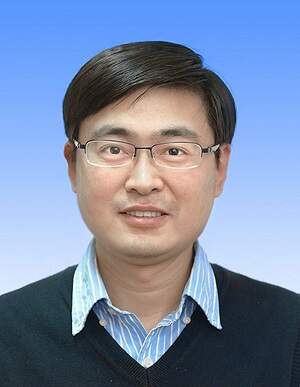
-
Wei Feng
Ph.D, Prof.
-
Principal Investigator National Laboratory of Biomacromolecules, IBP
Research Interests: Structural biology of cell polarity regulation and intracellular transport
Email: wfeng@ibp.ac.cn
Tel: 010-64888751, 010-64888853
Address: 15 Datun Road, Chaoyang District, Beijing, 100101, China
Chinese personal homepage
- Biography
-
1997 - 2001 B.Sc. in Chemistry, Fudan University
2001 - 2005 Ph.D. in Biochemistry, Hong Kong University of Science and Technology (HKUST)
2005 - 2007 Postdoctoral Research Associate, Department of Biochemistry, HKUST
2007 - 2009 Research Assistant Professor, Department of Biochemistry, HKUST
2009 - Principal Investigator, Institute of Biophysics, Chinese Academy of Sciences
- Awards
- Membership in Academies & Societies
- Research Interests
-
On the basis of X-ray crystallography, Cryo-EM and NMR spectroscopy, we focus on the structural and functional studies of protein complexes that are involved in the control of the cell polarity and molecular motors that play prominent roles in regulating intracellular transport.
1. Structural dissection of protein complexes involved in the control of cell polarity
Polarization of cells is a fundamental process vital for a variety of biological activities such as embryonic asymmetric cell division, epithelial differentiation, neuronal development, and cancer cell migration. Both establishment and maintenance of cell polarity are complicated processes and rigorously regulated by a number of protein complexes. These protein complexes are evolutionally conserved and restrictedly distributed at the specific cell cortex acting as hallmarks of cellular polarization. We focus on the structural and functional dissection of these protein complexes, and aim to investigate how these protein complexes assemble and what's the biological significance for regulating cell polarity. The results of our research will provide mechanistic insights into the organization of cell polarity-regulatory protein complexes and may also hopefully generalize some rules for the establishment and maintenance of cell polarity.
2. Structural basis for molecular motor-mediated intracellular transport
Intracellular transport is a fundamental biological process responsible for delivering, exchanging, and recycling of biological materials within cells. Dysfunction of this process is coupled with a large number of pathological diseases. Molecular motors are cytoskeleton-based biological molecular machines capable of carrying cargo vesicles and walking along the cytoskeletons, and thus function as core components for intracellular transport. We work on the structural and functional studies of molecular motors, and are mainly interested in how the activity of molecular motors is exquisitely regulated in terms of the monomer-dimer conversion and the motor activation-inactivation. Our overall research will provide the molecular mechanism for the motor regulation and may also shed some light on molecular motor-mediated intracellular transport.
- Grants
- Selected Publications
-
( *: corresponding authors)
1. Wang, W., Ren, J., Song, W., Zhang, Y., andFeng, W.*, (2022). "The architecture of kinesin-3 KLP-6 reveals a multilevel-lockdown mechanism for autoinhibition. "Nat Commun. 13(1): 4281.
2.Ren, J., Li, D., Liu, J., Liu, H., Yan, X., Zhu, X.*, andFeng, W.*, (2022). "Intertwined Wdr47-NTD dimer recognizes a basic-helical motif in Camsap proteins for proper central-pair microtubule formation. "Cell Rep. 41(6): 111589.
3.Cong, D., Ren, J., Zhou, Y., Wang, S., Liang, J., Ding, M.*, andFeng, W.*, (2021). "Motor domain-mediated autoinhibition dictates axonal transport by the kinesin UNC-104/KIF1A. "PLOS Genet. 17(11): e1009940.
4.Zhao, Y., Song, E., Wang, W., Hsieh, CH., Wang, X.,Feng, W.*, Wang, X. * and Shen., K*, (2021). "Metaxins are core components of mitochondria transport adaptor complexes. "Nat Commun. 12(1):83.
5.Ren, J., Liang, R., Wang, W., Zhang, D., Yu, L., andFeng, W.*, (2020). "Multi-site-mediated entwining of the linear WIR-motif around WIPI β-propellers for autophagy."Nat Commun. 11(1): 2702.
6.Zhang, Z., Li, W., Yang, G., Lu, X., Qi, X., Wang, S., Cao, C., Zhang, P., Ren, J., Zhao, J., Zhang, J., Hong, S., Tan, Y., Burchfield, J., Yu, Y., Xu, T., Yao, X., James, D.,Feng, W.*, and Chen, Z.*, (2020). "CASK modulates the assembly and function of the Mint1/Munc18-1 complex to regulate insulin secretion."Cell Discov. 6(1): 92.
7.Xu, Y., Ren, J., He, X., Chen, H., Wei, T.*, andFeng, W.*, (2019). "YWHA/14-3-3 proteins recognize phosphorylated TFEB by a noncanonical mode for controlling TFEB cytoplasmic localization. "Autophagy15(6): 1017-1030.
8.Ren, J., Wang, S., Chen, H., Wang, W., Huo, L., andFeng, W.*, (2018). "Coiled-coil 1-mediated fastening of the neck and motor domains for kinesin-3 autoinhibition. "Proc Natl Acad Sci U S A115(51): E11933-E11942.
9.Kong, R., Yi, F., Wen, P., Liu, J., Chen, X., Ren, J., Li, X., Shang, Y., Nie, Y., Wu, K., Fan, D., Zhu, L.*,Feng, W.*, and Wu, J.Y.*, (2015) "Myo9b is a key player in SLIT/ROBO-mediated lung tumor suppression. "J Clin Invest. 125(12): 4407-20.
10.Huo, L., Wen, W., Wang, R., Kam, C., Xia, J.,Feng, W.*, and Zhang, M.*, (2011) "Cdc42-dependent formation of the ZO-1/MRCK complex at the leading edge controls cell migration. "EMBO J. 30(4): 665-78.
11.Yu, C.#,Feng, W.#, Wei, Z., Miyanoiri, Y., Wen, W., Zhao, Y., and Zhang, M., (2009) "Myosin VI undergoes cargo-mediated dimerization."Cell. 138(3): 537-48. (#: co-first authors)
12.Feng, W. and Zhang, M., (2009) "Organization and dynamics of PDZ-domain-related supramodules in the postsynaptic density. "Nat Rev Neurosci. 10(2): 87-99. (invited review)
(From Wei Feng, June 1, 2023)

